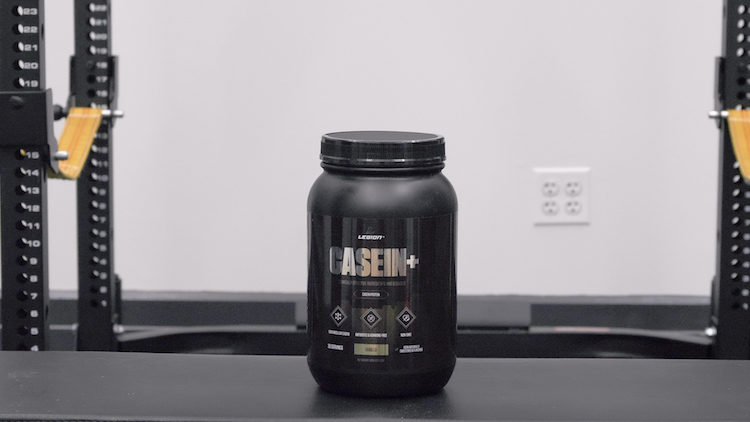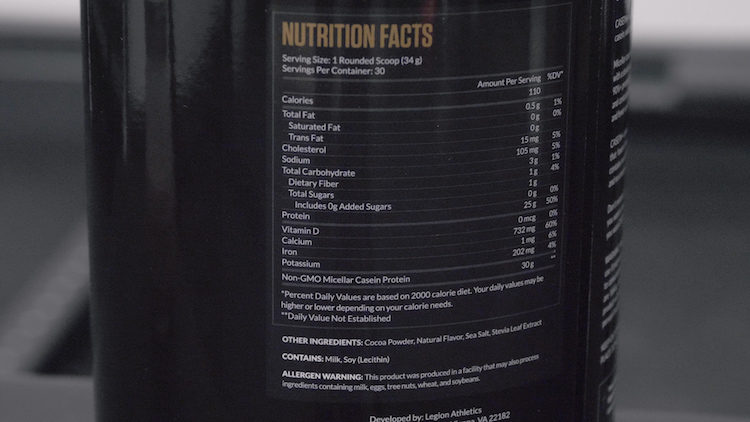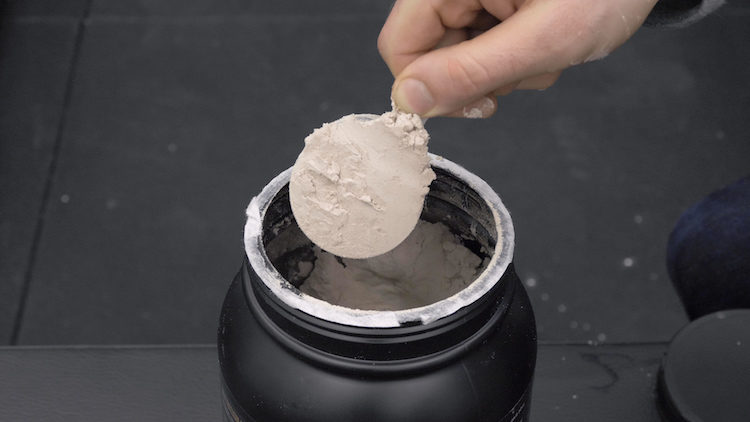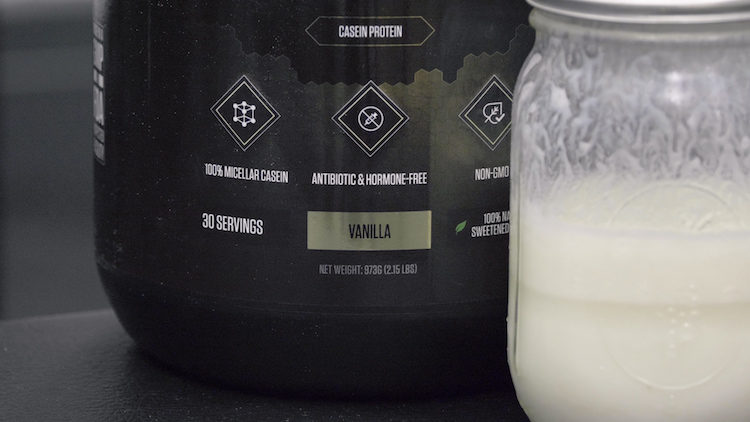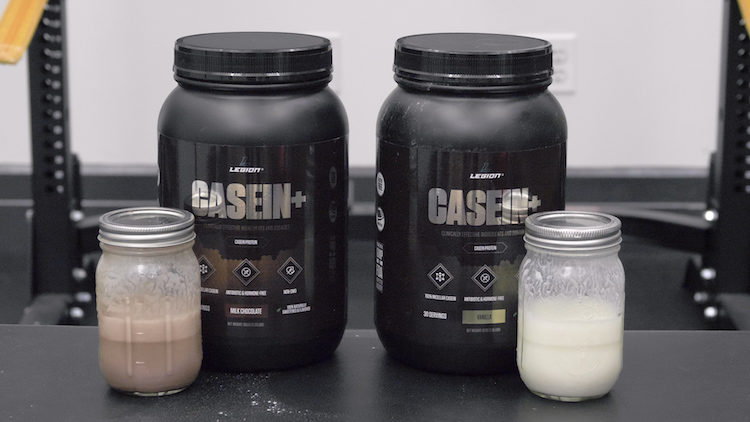Legion is a supplement company that’s newer than some of their competitors, but they’ve pulled ahead to the forefront of the industry with transparent labeling, science-backed dosages, and by appealing to the “no artificial ingredients” crowd. Full disclosure, we’re big fans at BarBend. We named their creatine the best creatine supplement on the market, theirs is the best mass gainer, and their pre workout “Pulse” is one of the strongest you’re likely to find.
So we were impatient to try out their casein protein powder, simply called Casein+. Legion sent us their Milk Chocolate and Vanilla flavors so we could try them out. We found out that not only is it really high quality casein, it packs more protein per calorie than any of their competitors we’ve tried.
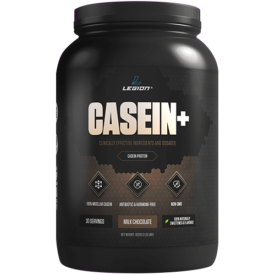
Legion Casein+ Nutrition
One scoop of the Milk Chocolate has 110 calories:
Protein: 30 grams
Carbs: 3 grams (1g fiber, 1g sugar)
Fat: 0 grams
Calcium: 60% of your recommended daily intake
Cholesterol: 5% RDI
Sodium: 5% RDI
There’s not much else by way of vitamins and minerals, just about 5 percent of your daily iron and potassium.
Note that if you add up all the ingredients this should be closer to 132 calories (120 for the protein and 12 for the carbs.)
Legion Casein+ Ingredients
The first ingredient is labeled Non-GMO Micellar Casein Protein.
Then there’s cocoa powder, natural flavor, sea salt, stevia leaf extract, and soy lecithin. The Vanilla flavor has the same ingredients but without the cocoa.
Legion Casein+ Benefits & Effectiveness
For starters, this is the most protein dense casein we’ve ever seen. Normally you’ll get something like 25 grams of protein for 3-ish grams of carbs and 2-ish grams of fat. This has 30 grams of protein and no fat at all per scoop, so you’re looking at about 4.4 calories per gram of protein. That’s got more protein per calorie than your average whey isolate.
The calcium here is remarkable as well, though not all that strange for a casein. Sixty percent of your intake is huge and it’s worth remembering that calcium, in addition to its link with bone health, also has some connections to fat loss and testosterone.(1)(2)
So why pick a casein protein? Besides the fact that it forms clumps easily and makes great protein puddings, casein digests more slowly than whey.(3)(4) This means that amino acids are release more slowly into your system — it’s unlikely that this makes casein any more anabolic than whey, but it’s also no worse. Casein is a valid alternative to whey and the slow digestion rate makes it more filling, which can certainly have benefits for weight loss.
[Learn more in our full breakdown of the differences between whey and casein.]
Legion also has interesting sourcing methods with their casein, getting everything from small Irish dairy farms. According to their site, the regulatory policies in Ireland mean that the milk there “generally has a lower somatic cell count (and thus is higher quality) than the milk produced in the USA.”(5)
The dairy isn’t 100 percent grass fed as the cows have to come inside during winter, but they do spend a lot of their time outdoors and they’re not treated with bovine growth hormone, so if happy cows are important to you, you’ll be happy with the sourcing.
The main potential issue is that it contains soy, to improve mixability. Evidence doesn’t suggest that soy lecithin negatively affects your testosterone anything else, but if you try to avoid soy you may not be happy.
Finally, there are no digestive enzymes added, which is something some other casein products throw in to potentially improve absorption and reduce digestive distress. This isn’t a big problem, but some people prefer enzymes in their protein powders.
Legion Casein+ Price
You can pick up a tub of 30 servings for $35 to $45, which comes to roughly $1.33 per scoop or 4.5 cents per gram of protein.
That’s remarkably inexpensive for a casein. Legion’s products are usually on the pricier side but this price is on lower than you’ll find among many competitors, brands that aren’t quite as proud to talk about their dairy sourcing and are less reluctant to avoid artificial ingredients. I was surprised and impressed with the value.
Legion Casein+ Taste
Neither the Milk Chocolate nor the Vanilla have a delicious dessert flavor like you’re likely to find in an artificially flavored competitor. I enjoyed them nonetheless, but they’re mild and you can tell that the product is totally free from fat — there’s none of the creaminess you sometimes find in fattier whey concentrates. It’s not unenjoyable, but the flavor is way better when mixed with some full fat milk instead of water.
The Takeaway
Pros
- All natural
- Very high in protein
- Free range dairy
Cons
- Contains soy
- No digestive enzymes
- Not the best tasting
I was impressed with this product. It’s very reasonably priced and very high in protein when compared to competitors. There are no artificial ingredients (if that’s important to you) and the cows seem like they’re pretty happy. The biggest potential con is that it contains soy, but again, that should really only be an issue if you have an allergy or possibly if you’re on the Paleo diet or another restrictive diet. For the average person, there’s very little to take issue with Legion Casein+ — it’s one of our favorite protein supplements, period.
References
1. Cinar V, et al. Testosterone levels in athletes at rest and exhaustion: effects of calcium supplementation. Biol Trace Elem Res. 2009 Summer;129(1-3):65-9.
2. Christensen R, et al. Effect of calcium from dairy and dietary supplements on faecal fat excretion: a meta-analysis of randomized controlled trials. Obes Rev. 2009 Jul;10(4):475-86.
3. Boirie Y, et al. Slow and fast dietary proteins differently modulate postprandial protein accretion. Proc Natl Acad Sci U S A. 1997 Dec 23;94(26):14930-5.
4. Hoffman JR, et al. Protein – Which is Best? Sports Sci Med. 2004 Sep 1;3(3):118-30.
5. More S. Global trends in milk quality: implications for the Irish dairy industry. Ir Vet J. 2009 Apr 1;62 Suppl 4:S5-14.
